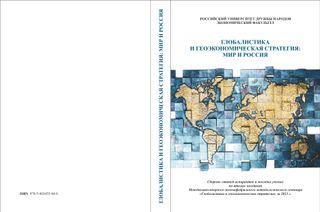?
Регулирование миграционных процессов в современной России
С. 59-67.
М. : [б.и.], 2017
Настоящий выпуск Аналитического вестника подготовлен по итогам Научно-методического семинара Аналитического управления Аппарата Совета Федерации на тему «Процессы в миграционной сфере: перспективы в рамках евразийской интеграции», состоявшегося 15 мая 2017 года.
В семинаре приняли участие представители Института социально-политических исследований РАН, Института государства и права РАН, Академии управления МВД России, ФГКУ «Всероссийский научно-исследовательский институт МВД России».
В ...
Added: July 5, 2017
Blum A., Zakharov S. V., Les Grands Dossiers de Diplomatie 2019 Vol. 51 P. 33-35
The demography of Russia is followed very carefully, excessively perhaps. First, because it is the object of a very strong attention of the Russian authorities and media, themselves, and that the demographic issue is often the subject of a particular announcement, in recent years, by Vladimir Putin during of his annual address to the nation. ...
Added: October 9, 2019
Khramova M. N., Лукьянец А. С., В кн. : Миграционные процессы и их влияние на демографическое и социально-экономическое развитие Дальнего Востока: сборник трудов II Международной научно-практической конференции, 4-5 июня 2018 г. : Владивосток : Издательский дом Дальневосточного федерального университета, 2018. С. 65-70.
The article analyzes the features of modern demographic development of Russian regions. It is shown that in the conditions of the narrowed reproduction regime, which is typical for the majority of the Russian regions, migration outflow becomes an additional barrier for the implementation of regional programs of social and economic development. The deformation of the ...
Added: September 4, 2018
Boyarkov R., В кн. : Российская политическая наука: истоки, традиции и перспективы. : М. : РИЦ МГГУ им. М. А. Шолохова, 2014. С. 84-86.
Какие политические факторы повлияли на смены векторов миграционной политики в период с 2000 по 2010 годы? В докладе предпринимается попытка ответа на данный вопрос, основываясь на результатах исследования автора в рамках проекта «Политические факторы реализации модернизационных программ: случай Стратегии социально-экономического развития Российской Федерации на период до 2010 года», поддержанного грантом РГНФ. Основной фокус исследования направлен ...
Added: March 18, 2015
Рязанцев С. В., Тер-Акопов А. А., Письменная Е. Е. et al., В кн. : Аналитический вестник Совета Федерации Федерального собрания Российской Федерации. Вып. 19 (676): Процессы в миграционной сфере и перспективы евразийской интеграции: опыт регионов.: М. : [б.и.], 2017. С. 7-17.
В статье представлены два сценария развития миграционной ситуации в ЕАЭС: экстенсивный и интенсивный. В экстенсивном сценарии развития миграционной ситуации в ЕАЭС рассматриваются перспективы географического расширения Евразийского экономического союза, оценивается влияние расширения на потоки трудовой миграции и социально-экономические последствия для вступающих в Союз стран. Оцениваются перспективы и эффекты от присоединения к ЕАЭС Республики Таджикистан. Авторы указывают, ...
Added: July 5, 2017
Karachurina L. B., В кн. : Российская экономика в 2015 году. Тенденции и перспективы. Вып. 37.: М. : Издательство Института Гайдара, 2016. Гл. 5.2. С. 320-332.
В главе анализируются миграционные процессы, происходившие в России, в 2015 г. Рассматриваются новации в миграционном законодательстве, долговременная миграция, внешняя трудовая миграция, внутренняя миграция. ...
Added: January 25, 2017
Zeveleva O., В кн. : Россия и Германия в пространстве европейских коммуникаций. : Тюмень : Издательство Тюменского государственного университета, 2013. Гл. 17. С. 246-263.
This paper analyzes German and Russian ideas of nationhood as conceived by the state through the states’ migration and repatriation policies. Immigration policies at large and repatriation policies in particular are viewed in this paper as symptomatic means of understanding inclusion and exclusion in a nation-state, and evolution of such policies are taken as indicators ...
Added: January 20, 2014
Сулейманова Ш. С., Липина С. А., Bazavliuk V., Этносоциум и межнациональная культура 2013 № 9 (63) С. 9-25
The article raises the question of realization of the Concept of state migration policy of Russia till 2025. With the help of the appeal to the migration experience of a number of States with similar migration conditions shall be identification of the range of problems faced by Russia during the implementation of the Concept and ...
Added: January 29, 2014
Zeveleva O., , in : Rückkehr in die Fremde?: Ethnische Remigration russlanddeutscher Spätaussiedler. : Berlin : Frank & Timme, 2014. Ch. 2. P. 35-66.
This book is a collection of works dedicated to the study of Russian-Germans in Germany and in comparative perspective. The chapter by Olga Zeveleva handles the topic of German repatriation programs as compared to programs initiated by Russia and Kazakhstan. The paper explores the political aspects of the history of repatriation programs and analyzes their ...
Added: November 29, 2014
Мукомель В. И., Choudinovskikh O., Полетаев Д. В. et al., М. : Academia, 2014
Книга посвящена освещению проблем миграции, широко обсуждаемым в российском обществе. Основное внимание уделяется роли миграции во внутренней политике и распространенности ксенофобных настроений в обществе, повседневным практикам мигрантов, дискриминации в отно- шении мигрантов, анализу зарубежного опыта.
Для широкого круга специалистов и читателей, интересующихся вопросами миграции и миграционной политики. ...
Added: November 5, 2014
Глушкова В. Г., Khoreva O., М. : КноРус, 2013
Учебное пособие предназначено для студентов бакалавриата, магистратуры, аспирантов, преподавателей экономических вузов, слушателей системы дополнительного профессионального образования, интересующихся вопросами демографии, региональной экономики и политики. Отражены теоретические основы демографической и миграционной политики. Дана краткая история государственного управления в сфере демографии и миграции. Рассмотрен зарубежный опыт регулирования демографических и миграционных процессов. Отдельное место занимает рассмотрение региональных особенностей демографической и ...
Added: July 24, 2013
Крамаренко А. С., Затулин К. Ф., Егоров В. Г. et al., Прометей, 2023
The book “The current situation of compatriots living in the countries of the post-Soviet space: a comparative analysis” contains the results of a study conducted in Azerbaijan, Armenia, Belarus, Georgia, Kazakhstan, Kyrgyzstan, Latvia, Lithuania, Moldova, the Transnistrian Republic of Moldova, Tajikistan, Uzbekistan, and Estonia. The study was carried out by the Institute of Diaspora and ...
Added: January 16, 2024
